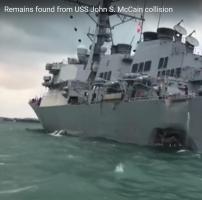 The deaths of 17 sailors in the separate collisions with merchant ships of the Arleigh Burke-class destroyers USS Fitzgerald and the USS John S. McCain has raised fundamental questions about the seamanship of US naval officers on the two ships, and by implication, the fleet as a whole. A three-month internal review conducted by senior U.S. surface fleet leaders of the seamanship and ship handling skills of new deck officers has yielded deeply concerning results.
The deaths of 17 sailors in the separate collisions with merchant ships of the Arleigh Burke-class destroyers USS Fitzgerald and the USS John S. McCain has raised fundamental questions about the seamanship of US naval officers on the two ships, and by implication, the fleet as a whole. A three-month internal review conducted by senior U.S. surface fleet leaders of the seamanship and ship handling skills of new deck officers has yielded deeply concerning results.
The review found some or significant concerns with the ship-handling skills of nearly 85 percent of its junior officers, and that many struggled to react decisively to extricate their ship from danger when there was an immediate risk of collision, according to an internal message obtained by Defense News.
Defense News reports: Led by the Surface Warfare Officer School, officer of the deck competency checks were conducted on a random selection of OOD-qualified first-tour division officers (the newest officers in the fleet) in underway bridge navigation simulators fleet-wide between January and March. Of the 164 officers who were evaluated, only 27 passed with “no concerns.” Another 108 completed with “some concerns,” and 29 had “significant concerns,” according to the message, which was released by the Navy’s top surface warfare officer Vice Adm. Richard Brown.
Among the shortfalls identified in the checks:
- Officers struggled with operating radars and the associated tools at hand, an issue that emerged in the wake of the Fitzgerald accident.
- Officers had a firm grasp of the international rules of the road for navigating ships at sea, but struggled to apply them practically during watch standing, especially in low-visibility situations.
- Most officers were able to keep clear of close encounters with other ships in the simulator but those that found themselves in extremis “were often ill-equipped to take immediate action to avoid collisions” — a factor that was a direct contributor to the loss of life in both the John S. McCain and Fitzgerald collisions in 2017.
In his message to the fleet, Brown said the OOD competency reviews should be a call to action for the surface community to get after its shortcomings.

The aviation industry has handled similar (although with freedom of movement in three axes) for decades via recurrent training with simulators.
Some billions into the hands of Lockheed etc. over the course of a decade or so and we will reproduce what we created.
To the above post. There was a previous article where it was mentioned the Navy had cut back its training in simulators and other required training for financial cutbacks
God help us in actual war!
Complacency and laziness by tutors.
Too busy having fun with Fat Leonard.
Thanks to the Old Salt Blog, I know about the Fat Leonard scandal. The news, which loves scandal, seems to be suspiciously quiet about the predicament of our Navy and its scandals.
It sounds like the Chinese government just recently hacked our Navy computers on the Sea Dragon project?